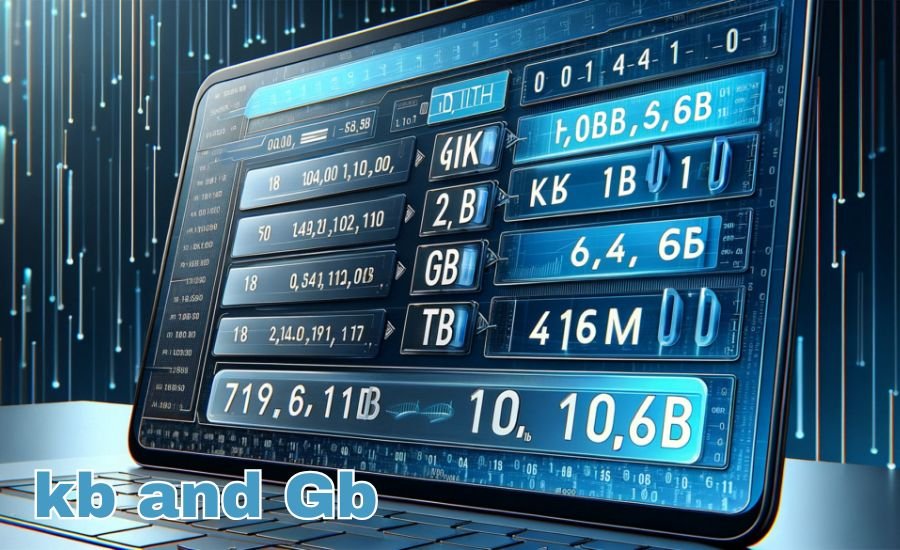KB and GB are essential words in the world of computers. KB stands for kilobyte, and GB stands for gigabyte. They help us understand how much space we have on our devices and how much information we can store.
When you save pictures, music, or games on your computer, you use KB and GB to measure the size of these files. Knowing their differences can help you keep your devices organized and avoid running out of space!
What is a KB, and Why is it Important?
A KB, or kilobyte, is a unit that measures data size. One kilobyte is equal to 1,024 bytes. This small amount of data stores simple files like text documents. Knowing what KB means helps you understand how much space your files occupy on your computer.
Understanding KB is essential because it helps you manage your files better. For example, if you are writing a story in a text document, it may only take up a few KB. However, if you save pictures or music, they will use more space. Recognizing the size of different files can help you keep your device organized.
What is a GB, and How Does it Compare to a KB?

A GB, or gigabyte, is much larger than a KB. about 1,073,741,824 bytes! GB is used to measure larger files, like videos or games. Knowing the difference between KB and GB helps you decide what files to save and which to delete.
When you look at your computer’s storage, you often see the GB size. This helps you know how much space you have left. For example, if your computer has 256 GB, you can store many songs and videos. Understanding GB makes it easier to manage your storage.
How to Calculate KB and GB: A Simple Guide
Calculating KB and GB is relatively easy. First, know that 1 GB equals 1,024 MB, and 1 MB equals 1,024 KB. You can use these numbers to convert sizes. For example, if you have a file that is 2 MB, you can change it to KB by multiplying it by 1,024. This means 2 MB is 2,048 KB!
Sometimes, you may need to convert KB to GB, especially when dealing with larger files. To do this, divide the KB number by 1,048,576 (1,024 x 1,024). For example, 2,048 KB is 0.002 GB. Understanding how to calculate these sizes is helpful for anyone using a computer.
Why Do We Need to Know About KB and GB?
Knowing about KB and GB helps you keep your computer or device running smoothly. You need to pay attention to how much space files take to avoid running out of storage. This can make your device slow or unable to save new files.
Also, knowing KB and GB can help you decide what to keep. You may have many pictures, but they could take up a lot of space in GB. Understanding sizes enables you to choose what to keep and what to delete. This is important for staying organized and avoiding clutter.
Examples of KB and GB in Everyday Life
Everyday life is filled with examples of KB and GB. For instance, a simple text file might only be a few KB, while a high-quality movie can be several GB. Knowing this helps you make choices when downloading or saving files.
When you take pictures on your phone, each photo can be a few hundred KB to several MB, depending on the quality. Videos, on the other hand, can take up several GB. This shows how quickly storage can fill up. Recognizing the difference can help you manage your device better.
How Much Space Do You Need? Understanding KB and GB

When choosing storage, you must think about how much space you need. For basYouneed a lot of GB. However, if you enjoy gaming or storing videos, you will need more space in GB for basic tasks like writing documents.
Before buying a new device, consider what you plan to store. If you only need to save documents, 128 GB may be enough. But if you want to save music and movies, look for at least 256 GB. Understanding KB and GB helps you make the right choice.
The Difference Between KB, MB, and GB Explained
KB, MB, and GB are all data units of measurement. KB is the smallest, followed by MB, which is 1,024 KB, and finally, GB, which is 1,024 MB. Each step up means more space for your files. Knowing these differences helps you understand file sizes better.
For example, a small document may only be a few KB, while a larger one could be several MB. Videos can easily be several GB. Understanding these measurements helps you choose the correct files to save and manage your storage.
Do You Know: 5980-27-3726-71
How KB and GB Affect Your Device Performance
Storage size affects how well your device works. If your device is complete, it may run slowly. When you understand KB and GB, you can keep your device running smoothly by deleting unnecessary files. This helps free up space and improves performance.
Regularly checking your storage can help you manage it better. If your storage is getting low, consider removing large files in GB. This can make your device faster and more efficient. Knowing about KB and GB is vital to keeping your device healthy.
Managing Your Files: Tips for Using KB and GB
Managing files is easier when you understand KB and GB. Start by organizing your files into folders. This way, you can easily find what you need and keep track of your storage. Using folders also helps you see how much space each file type uses.
Make it a habit to look at how much space you have left. If you see you’re running low, delete files you no longer need. By managing your files carefully, you can avoid running out of space.
Converting KB and GB: How to Do It Easily

Converting KB and GB is simple once you know the numbers. To convert KB to MB, divide the KB amount by 1,024. To change MB to GB, divide the MB amount by 1,024 again. This makes it easy to compare file sizes.
You can also use online converters to help with this. Many websites let you input a size and choose a conversion. This makes it quick and easy to understand different file sizes. Knowing how to convert helps you manage your storage better.
Common Mistakes People Make with KB and GB
Many people need help with KB and GB. One common mistake is not checking file sizes before downloading, which can quickly fill up storage. Always look at how much space a file will take before saving it.
Another mistake is not organizing files. When files are sorted, it can be easy to find what you need. Regularly managing your files helps prevent this. You can avoid these common issues and keep your device organized by understanding KB and GB.
KB and GB Simplified
In conclusion, understanding KB and GB is essential for everyone using a computer or device. Knowing these measurements helps you manage storage and keep your files organized. Remember, KB is small, while GB is more significant and used for bigger files.
Learning about these concepts can keep your device running smoothly and efficiently. Whether you save documents or videos, knowing KB and GB helps you make intelligent choices. Start paying attention to these measurements today!
Conclusion
In conclusion, understanding KB and GB helps us better manage our computers and devices. Knowing the difference between these measurements makes organizing our files easier and avoids running out of space. When you keep track of how much storage you have, your device can run faster and smoother.
Also, learning about KB and GB is essential for everyone, especially if you like to save pictures, music, or videos. Being smart about your storage lets you keep your favorite files safe without cluttering your device. Remember, a little knowledge about KB and GB goes a long way!
Read More: partition-expiration-time-paimon
FAQs
Q: What does KB stand for?
A: KB stands for kilobyte, which measures small amounts of data.
Q: What does GB stand for?
A: GB stands for gigabyte, a larger unit measuring bigger files.
Q: How many KB are in a GB?
A: There are 1,024,000 KB in one GB.
Q: Why is it important to know about KB and GB?
A: Knowing about KB and GB helps you manage your storage and keep your device running well.
Q: Can I convert KB to GB?
A: You can convert KB to GB by dividing the KB amount by 1,048,576.
Q: What kind of files usually take up GB?
A: Large files like videos and games usually take up GB of space.
Q: How can I free up space on my device?
A: You can free up space by deleting files you no longer need and organizing your storage.
A: KB stands for kilobyte, which measures small amounts of data.
Q: What does GB stand for?
A: GB stands for gigabyte, a larger unit measuring bigger files.
Q: How many KB are in a GB?
A: There are 1,024,000 KB in one GB.
Q: Why is it important to know about KB and GB?
A: Knowing about KB and GB helps you manage your storage and keep your device running well.
Q: Can I convert KB to GB?
A: You can convert KB to GB by dividing the KB amount by 1,048,576.
Q: What kind of files usually take up GB?
A: Large files like videos and games usually take up GB of space.
Q: How can I free up space on my device?
A: You can free up space by deleting files you no longer need and organizing your storage.
